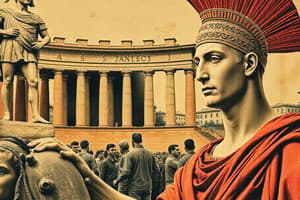Podcast
Questions and Answers
Who were the three men ruling collectively in Rome known as the Triumvirate?
Who were the three men ruling collectively in Rome known as the Triumvirate?
Octavian (Augustus) Caesar’s Nephew, Mark Antony, Lapidus
Which Emperor of Rome was stationed in Egypt with Cleopatra?
Which Emperor of Rome was stationed in Egypt with Cleopatra?
Mark Antony
Who adopted Tiberius as a wealthy son due to having no surviving heirs?
Who adopted Tiberius as a wealthy son due to having no surviving heirs?
Augustus (Emperor Augustus)
Which dynasty in Rome was known for its cruel tyrants who used murder as a control factor?
Which dynasty in Rome was known for its cruel tyrants who used murder as a control factor?
Who were the Emperors of the 5 Good Emperors Dynasty that expanded the empire and led to economic thriving?
Who were the Emperors of the 5 Good Emperors Dynasty that expanded the empire and led to economic thriving?
Which Emperor, not part of the 5 Good Emperors, was described as juvenile, incompetent, and decadent?
Which Emperor, not part of the 5 Good Emperors, was described as juvenile, incompetent, and decadent?
Which emperor of Rome was stricken from the official records due to his incompetent and decadent behavior?
Which emperor of Rome was stricken from the official records due to his incompetent and decadent behavior?
Which emperor's actions led to Rome being split into two by the late 300s?
Which emperor's actions led to Rome being split into two by the late 300s?
Who was the first emperor of the 5 Good Emperors Dynasty?
Who was the first emperor of the 5 Good Emperors Dynasty?
Which emperor of Rome started a rumor about Mark Antony and Cleopatra conspiring to take control of Rome from Egypt?
Which emperor of Rome started a rumor about Mark Antony and Cleopatra conspiring to take control of Rome from Egypt?
Which emperor of Rome used empirical money (collected taxes) as their own funds and humiliated the senate?
Which emperor of Rome used empirical money (collected taxes) as their own funds and humiliated the senate?
Flashcards
Triumvirate
Triumvirate
The collective rule of Octavian, Mark Antony, and Lepidus in Rome.
Mark Antony
Mark Antony
Emperor who was stationed in Egypt with Cleopatra.
Augustus
Augustus
The first Roman Emperor who adopted Tiberius as a son.
Julio-Claudian Dynasty
Julio-Claudian Dynasty
Signup and view all the flashcards
5 Good Emperors
5 Good Emperors
Signup and view all the flashcards
Commodus
Commodus
Signup and view all the flashcards
Commodus' removal
Commodus' removal
Signup and view all the flashcards
Division of Rome
Division of Rome
Signup and view all the flashcards
Nerva
Nerva
Signup and view all the flashcards
Augustus' rumor
Augustus' rumor
Signup and view all the flashcards
Empirical money usage
Empirical money usage
Signup and view all the flashcards
Study Notes
Roman Emperors and Dynasties
- Octavian (Augustus) Caesar's nephew becomes Emperor of Rome and institutes the Triumvirate, a system of three men ruling collectively.
- Mark Antony is stationed in Egypt with Cleopatra, but is eventually assassinated.
- Lapidus, hungry for power, starts a rumor that Mark Antony and Cleopatra plan to take control of Rome from Egypt.
Julio-Claudian Dynasty (27 BCE-68 AD)
- Augustus Caesar rules Rome, and the city thrives economically and culturally.
- Augustus has no surviving heirs, so he adopts Tiberius, a wealthy son.
- The Julio-Claudian Dynasty is marked by cruel tyrants who use murder as a control factor, humiliate and manipulate the senate, and use imperial money (collected taxes) as their own funds.
- The dynasty includes:
- Augustus (27 BCE-14 AD)
- Tiberius (14-37 AD)
- Caligula (37-41 AD)
- Claudius (41-54 AD)
- Nero (54-68 AD), whose name is eventually stricken from Roman official records.
Flavian Dynasty (69-96 AD)
- Vespasian becomes the first emperor of the Flavian Dynasty, implementing military, senate, and tax reforms.
- The final emperor of this dynasty rules with tyranny, high taxes, and limited senate power, and their name is eventually stricken from Roman official records.
5 Good Emperors Dynasty (96-180 AD)
- This dynasty expands the empire, consolidates leadership, and experiences economic thriving under:
- Nerva (96-98)
- Trajan (98-117)
- Hadrian (117-138)
- Antoninus Pius (138-161)
- Marcus Aurelius (161-180)
- Commodus (180-192) is not part of the 5 Good Emperors, being juvenile, incompetent, and decadent, leading to Rome's decline.
Decline of Rome
- Rome tries to reform itself and regain its standing as a true empire, but by the late 300's, it is split into two.
Studying That Suits You
Use AI to generate personalized quizzes and flashcards to suit your learning preferences.




